

Health 2.0 Code-a-thon sends IT innovators scrambling. Accelerator. Click here to see the list of 2014 SXSW Accelerator winners.
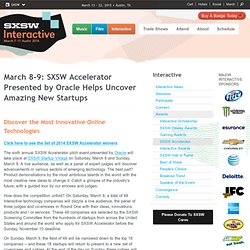
The sixth annual SXSW Accelerator pitch event presented by Oracle will take place at SXSW Startup Village on Saturday, March 8 and Sunday, March 9. A live audience, as well as a panel of expert judges will discover advancements in various sectors of emerging technology. The best part? Product demonstrations by the most ambitious talents in the world with the most creative new ideas to change it. Catch a glimpse of the industry's future, with a guided tour by our emcees and judges. How does the competition unfold? Mark A. Hanson, PhD: "Wireless sensors have the... Apple changes mHealth game with HIPAA security claims.
Apple's claim that FaceTime video chat can be made HIPAA-compliant could be a game-changer for telemedicine specifically and healthcare generally.
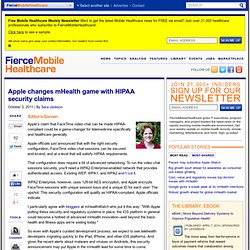
Apple officials just announced that with the right security configuration, FaceTime video chat sessions can be secured end-to-end, and at a level that will satisfy HIPAA requirements. That configuration does require a bit of advanced networking. To run the video chat sessions securely, you'll need a WPA2 Enterprise-enabled network that provides authenticated access. Marketing Medical Devices: EndoGoddess App At Apple Store. Pediatric endocrinologist Dr.
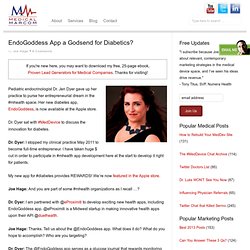
Jen Dyer gave up her practice to purse her entrepreneurial dream in the #mhealth space. Her new diabetes app, EndoGoddess, is now available at the Apple store. Dr. Dyer sat with #MedDevice to discuss the innovation for diabetes. Dr. My new app for #diabetes provides REWARDS! Home. Ten predictions for the mobile health market. If “An Apple a Day Keeps the Doctor Away,” can mHealth Apps Bring Patients and Healthcare Folks Together?
Mobile Health Apps That Share. A set of tools for building cell-phone apps that collect health-related information aims to change the way health information is stored, shared, and used.
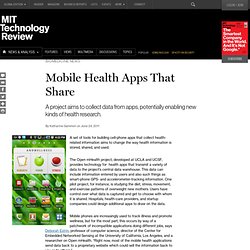
The Open mHealth project, developed at UCLA and UCSF, provides technology for health apps that transmit a variety of data to the project’s central data warehouse. This data can include information entered by users and also such things as smart-phone GPS- and accelerometer-tracking information. One pilot project, for instance, is studying the diet, stress, movement, and exercise patterns of overweight new mothers. Users have control over what data is captured and get to choose with whom it is shared. Hospitals, health-care providers, and startup companies could design additional apps to draw on the data. mHealth Providers Learning It’s All About Competitive Cooperation. mHealth (also written as m-health or mobile health) is a term used for the practice of medical and public health supported by mobile devices.
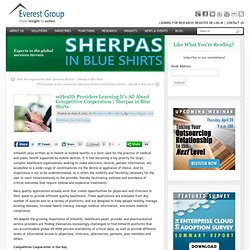
It is fast becoming a top priority for large, complex healthcare organizations seeking to make electronic records, patient information, etc. accessible to a wide range of constituencies via the device or appliance of choice. And its importance is not to be underestimated, as it offers the mobility and flexibility necessary for the user to react instantaneously to the provider, thereby facilitating wellness and avoidance of critical outcomes that require intense and expensive treatments. Many quality applications already exist that create opportunities for physicians and clinicians in their quest to provide efficient quality healthcare.
Competitive Cooperation Is the Key There are several types of mHealth providers. Microsoft Unlocks Mobile Access To HealthVault. Personal health record's software development kit makes it easier to develop healthcare apps for Windows Phone 7, iPhone, and Android.
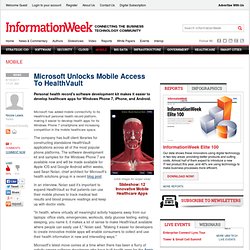
(click image for larger view) Slideshow: 12 Innovative Mobile Healthcare Apps Microsoft has added mobile connectivity to its HealthVault personal health record platform, making it easier to develop health apps for its Windows Phone 7 smartphone and increasing competition in the mobile healthcare space. The company has built client libraries for constructing standalone HealthVault applications across all of the most popular phone platforms.
Mobile Health Apps That Share. Will health apps save payors money? Some of the largest health insurers are increasing their mobile healthcare presence with patient-focused smartphone applications, reports AmedNews, with apps for physicians soon to follow.
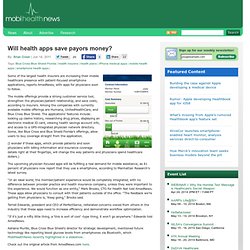
The mobile offerings provide a strong customer service tool, strengthen the physician/patient relationship, and save costs, according to insurers. Among the companies with currently available mobile offerings are Humana, UnitedHealthCare, and Blue Cross Blue Shield. The applications’ features include: looking up claims history, researching drug prices, displaying an electronic medical ID card, viewing health savings account info, and access to a GPS-integrated physician network directory. 6 Questions: Alan Portela, AirStrip. As an ongoing feature for our audience, Mobile Healthcare Today presents a series of short-form Q&As with executives, developers and other influential figures in the mobile healthcare sector, called 6 Questions.
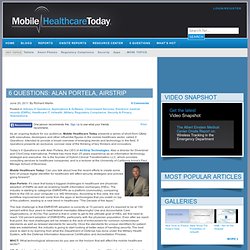
FDA clears Withings iPhone blood pressure cuff. Withings announced this week that they’ve received FDA clearance for their iOS-compatible blood pressure monitor, allowing for its immediate availability in the US for a $129.99 retail price.
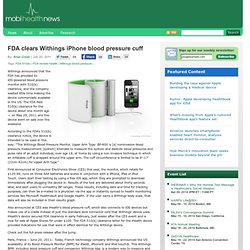
The release marks the first time an FDA-approved BP cuff includes direct connectivity with an iOS device. First announced at CES this year, the monitor runs on three AAA batteries and works in conjuction with an iPhone, iPad or iPod Touch. Users start the testing by using the free iOS app, which delivers results about thirty seconds later. Orange Juice – SKD's blog on Intersection of Design, Business and Culture » Creating a Consumer Movement in Wireless Health.
An Interview with WLSA VP of Partner Development, Paul Sonnier One of the biggest opportunities for accelerating the adoption of Wireless Health is the creation of a consumer movement.
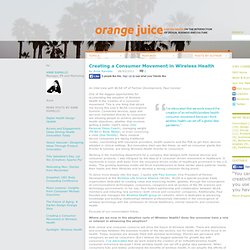
This is one thing that struck me during this year’s WLSA Convergence Summit. Connected devices, apps and services marketed directly to consumers are allowing people to achieve personal health objectives, whether that involves getting a better night’s sleep (Zeo Personal Sleep Coach), managing weight (Fit Bit or Body Media), or even conceiving a child (Duo Fertility).
Many medical device companies are taking traditional routes, coordinating with insurance providers, health systems and the FDA to get their devices adopted in clinical settings. #mhealth Innovation and Reimbursement - it will come #hcdc Come and discuss at healthca.mp/dc on 6/8/11 - More pre-blogspot than pre-posterous. Cambridge researchers release report on how mobile phones are transforming healthcare. >Many would argue the greatest promise of mobile health lies in the developing world – areas where low-cost, portable diagnostic and treatment tools could impact millions of people. Researchers at the University of Cambridge recently released a comprehensive study of mobile health applications in a nation where the confluence of poverty, geography, and rapid economic growth have created an environment where mobile health should thrive – China.
Having received unprecedented access from Mobile China, the largest mobile communications provider in the world, their findings are compiled in a 100+ page report on the promise of mobile health technology. As the lead author, Professor Ian Leslie, stated in an interview with Research News (a University of Cambridge publication), Beware of healthcare content FARMS like OrganizedWisdom.com. OrganizedWisdom Scandal inShare. Evidence-based Medicine gives way to Evidence-based Health but what we need is Evidence-based Choices via #mHealth - More pre-blogspot than pre-posterous. Texting their way to better health. A team of undergraduates from Harvard University, the University of Pennsylvania, and Central Connecticut State University is developing a technology-based solution to one of the most pressing problems plaguing maternal and child health in the developing world: inadequate prenatal and infant care.
Harvard sophomore Annie Ryu and her brother, Alex, a student at Penn, conceived the project last summer when Annie was working in Nicaragua and Alex was working in India with the nonprofit Karuna Trust. Concerned about the issues of poverty and low vaccination rates they saw, they began working on ways to improve the situation. #mcitizen MobileHealth #omhealth why it matters ( ) - More pre-blogspot than pre-posterous. Open #mhealth consortium the opening session - More pre-blogspot than pre-posterous. Open #mHealth Partnership Discussion. Where do we go from here? - More pre-blogspot than pre-posterous. Open #mHealth meeting - Washington DC #omhe followed by #mCitizen summit on Saturday - More pre-blogspot than pre-posterous. Health 2.0 Starts with Food. We’re posting today from San Diego, where Fooducate has been invited to demo our iPhone app at the Health 2.0 Conference.
Studies: SMS effective for smoking cessation. HealthCamp San Diego. Quantified Self Conference 2011. The 2014 Quantified Self Europe Conference will be our sixth gathering of the global community of self-trackers and tool-makers. US Wireless Quick Facts. How much do you know about the wireless industry's tremendously important impact in our lives, whether it's through the economy, innovation, competition, environmental and other societal benefits? We've assembled numerous facts from a variety of sources in our Resource Library, but here are some quick facts that provide an overview of the importance of the U.S. wireless industry: The economic impact of bringing 500 MHz of spectrum (per the FCC's National Broadband Plan) to market by 2020 is $87 billion increase in U.S.
GDP; at least 350,000 new U.S. jobs; additional $23.4 billion in government revenues; and $13.1 billion increase in wireless applications and content sales. U.S. providers invested $94 per subscriber while the rest of the world spent $16. The doors to mobile app development just got blown wide open.